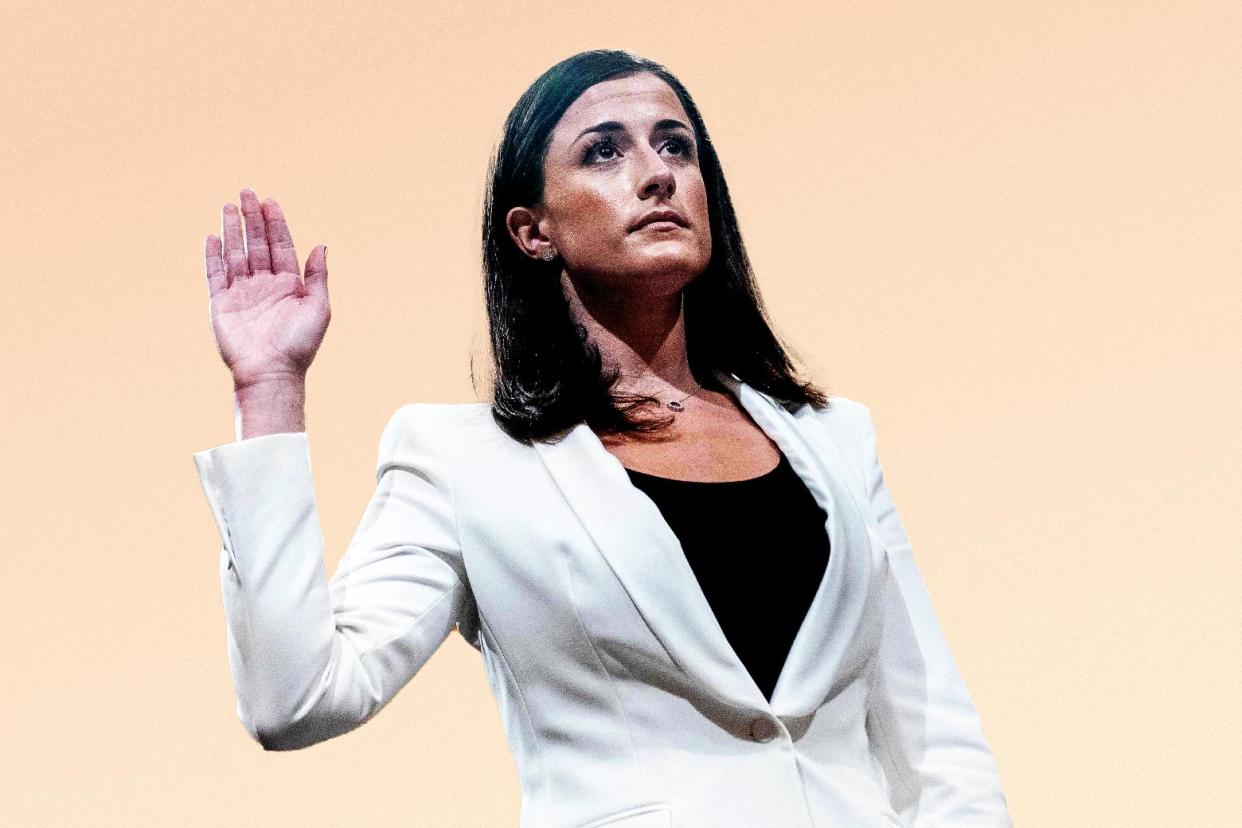Finally, a Trump Memoir That’s a Legitimate Page-Turner

- Oops!Something went wrong.Please try again later.
- Oops!Something went wrong.Please try again later.
- Oops!Something went wrong.Please try again later.
“This isn’t you,” Cassidy Hutchinson’s mother told her over the phone on that winter’s day. “You know better than this. You can’t fix him.” She wasn’t urging her daughter to leave an abusive partner. It was Jan. 6, 2021, and she was trying to persuade her daughter not to move to Florida to continue working in the orbit of the president who had just incited a violent attack on the Capitol building.
The similarity, although invisible to her at the time, is not lost on the Cassidy Hutchinson of Enough, her memoir of working in the Trump administration and the sensational public testimony she delivered at a hearing of the House committee on the attack. Enough is the kind of book—churned out in a year, printed on paper so fluffy the hardcover feels as light as a paperback—that’s typically scraped by news organizations for articles listing its top revelations or scandalous tidbits. And it has been, from the time Rudolph Giuliani trailed his finger up Hutchinson’s thigh at the Jan. 6 rally to scenes of her former boss, White House chief of staff Mark Meadows, burning documents during the final weeks of the administration—so many that his wife complained that his suits smelled “like a bonfire.”
Enough, however, is also a compelling and well-shaped narrative, more of a page-turner than any other Trump administration memoir I’ve read. (And I’ve read a lot.) Some credit for that is surely due to Hutchinson’s “collaborator,” Mark Salter, who wrote speeches for, and co-wrote books with, John McCain. Who knows which of them first realized how closely Hutchinson’s story follows the arc of an abuse memoir, but together they’ve crafted Enough into a quintessential specimen of the genre.
It begins with the New Jersey upbringing that primed Hutchinson to succumb to the alternate reality of Trump World. Her mother was so organized and competent that when Cassidy’s father suddenly decided to open a gelato shop, she ran it single-handedly while keeping house, raising two children, and doing the bookkeeping for his tree-maintenance company. That husband, by contrast, was volatile to the point of mental illness, charming and cruel; after they divorced, he vented his rage at his ex-wife by leaving two snapping turtles on the doorstep. By the end of Enough, he has simply vanished out of Hutchinson’s life without a goodbye.
The capability Hutchinson learned from her mom enabled her to parlay a handful of internships and a vague romantic attraction to Washington, D.C., into a junior position in Trump’s Office of Legislative Affairs. By the age of 24, the first member of her family to graduate from college, she was serving as the White House’s point person in the complex negotiations with Congress over a follow-up to the CARES relief bill during the pandemic. “I felt like I was in over my head,” Hutchinson admits, but Meadows was so paranoid about the more experienced staffers at the OLA that he ordered her not to consult with them for fear of the great bugaboo of the Trump White House: leaks.
The first matter of business Meadows chose to discuss with Hutchinson when she started working as his right hand was who ought to be fired for leaking. At a loss, and pressed by Meadows to identify somebody, Hutchinson fingered the deputy assistant to the president, Mike McKenna, an abrasive character prone to making crude, sexist remarks to female staffers. To Hutchinson’s shock, Meadows fired him.

The endless palace intrigues and general incompetence of the Trump White House made it a corrosive place for an unsophisticated young person to work. On the other hand, Hutchinson probably wouldn’t have risen so high so quickly if Trump’s senior aides weren’t consumed with plotting against one another and catering to their capo’s whims. Some, such as Kellyanne Conway (unmentioned in Enough), were purely opportunistic agents of chaos. Others were dazzled by their precipitous access to power and the prestige of the White House. Still others, such as Joint Chiefs of Staff Chair Mark Milley, feared that if they left the administration, they would be replaced by a more compliant toady who would fail to deflect Trump’s most catastrophic impulses.
Hutchinson, however, was something of a true believer, less because she was an ideologue than because she was a natural follower, eager to belong, and above all, to succeed at her first real job. Over and over, she was praised for her “loyalty,” and she admits that she once “adored” the president. “I believed sincerely that we were serving the interests of the American people,” she writes. An old-fashioned Republican—Mitt Romney was her notion of an inspiring candidate—she learned from those around her to make excuses for Trump’s “belligerence and crudity” and his “inappropriate, unpresidential tweets.” As the president went off the rails following his defeat in the 2020 election, she told herself that he was being misled by bad or crazy advisers. She responded to his “tantrums” by wondering why “people” had “let it go so far. Couldn’t we have done more—couldn’t I have done more—to serve him better, to avoid upsetting him.”
The Jan. 6 attack on the Capitol left Hutchinson shaken and guilty. She never doubted that Trump had lost the election, but she still planned to work for him in his post-presidential life, convinced that she had promised to do so and that Trump needed sober-minded helpers like herself. Of course, the loyalty that Trump demanded from his underlings was never returned.
Meadows explained that she, too, had come under suspicion as a leaker, an accusation that infuriated her. The job offers promptly evaporated—until the Jan. 6 committee started issuing subpoenas. Nearly broke but determined to avoid the strings connected to offers of legal help from Trump World, Hutchinson tried to find an attorney to represent her pro bono or for deferred payments. She spoke, fruitlessly, with dozens of lawyers, and fell behind on her rent. In desperation, she finally agreed to accept the “help” of a Trump-connected attorney who instructed her to tell the committee as little as possible. “Just like that,” she writes, “I was back in the Family.”
It was only then—hitting bottom, you could say—that the scales truly fell from Hutchinson’s eyes. Still, she was financially dependent on Trump and his allies. More job prospects were dangled before her (and ultimately snatched away). Finally, she turned to a friend, former White House director of strategic communications Alyssa Farah, who had become a prominent Trump critic following Jan. 6. “I think I’m on the wrong side of this,” she told Farah. “I don’t know what to do.” Farah enlisted Liz Cheney, the vice chair of the Jan. 6 committee, who would become her mentor. Cheney helped finagle Hutchinson out from under Trump World’s thumb and connected her to attorneys who would represent her pro bono (Enough is dedicated to them).
“I had learned over the last several years that I thrived when I had someone or something bigger than myself to fight for,” Hutchinson writes. While she made the decision to testify truthfully about the Trump White House to the Jan. 6 committee on her own, and her testimony took tremendous courage, it’s not clear she would have been able to go through with it without Cheney’s support and guidance. Perhaps Cheney has Hutchinson’s best interests at heart. Both of them do still believe in a version of the Republican Party—the Mitt Romney version—that Trump has effectively destroyed. You can read Enough as the story of a vulnerable young woman whose poisoned upbringing left her prone to mistaking a tyrant for a leader. Hutchinson ultimately managed to free herself from the tyrant’s snares, though it’s not clear her hero-worshipping tendencies won’t lead her to make the same mistake again. But at least she’s ahead of the rest of her party.

